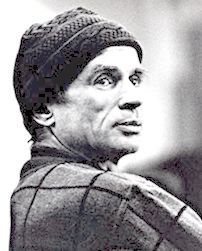Happy Birthday Rudolf Nureyev!
That's right, today another legend of the ballet world was born! On the 17th of March 1938 (or even possibly a few days earlier, according to some records) in a train on the trans-Siberian railway, Farida Nureyev gave birth to a son, Rudolf, who was to be raised in poverty and hardship, the youngest of four, and the only son of Hamet (a political education officer in the Red Army) and Farida Nureyeva. It was not a childhood devoid of pleasure entirely though, on New Year's Eve 1945 Farida managed to smuggle all her children into the town's majestic Opera House with only one ticket for a performance of the patriotic ballet 'Song of the Cranes', starring the Leningrad-trained Bashkir ballerina Zaituna Nazretdinova. At the age of six young Rudolf was immediately captivated, and decided on the spot to become a dancer, as is so often the way. This would cause some conflict between father and son (in an already lacking relationship due to Hamet's absence for military service up until Rudolf was eight) as Rudolf's father saw dance as a disappointing and 'unmanly' ambition. Nevertheless Rudolf pursued dancing, even after his father forbade him from taking any classes (Farida would 'turn a blind eye' to Rudolf sneaking out for class each week). After several years of working at the theatre and using the money to pay for classes with the local company, Rudolf went to Moscow, and despite a bad injury to his toes, successfully auditioned for the Bolshoi Ballet School. He decided however to persevere trying for the Leningrad school : not only was it said to be better but it was residential, solving the problem of living costs. So instead of returning home, the seventeen year old Rudolf spent his remaining earnings continuing on from Moscow to Leningrad, where he once again auditioned and was accepted, but told that "You'll become either a a brilliant dancer or a total failure - and most likely a failure".
For three years Rudolf pushed himself as hard as he could, practicing continually between classes and working to make up for whatever training and technical ability he lacked in comparison to the other students who had mostly joined the school seven years earlier (ten was the standard age). This didn't stop him from being headstrong and rebellious in his own way however. Students were not permitted to leave the dormitory but Rudolf thought this a silly rule and regularly broke it to watch any and all performances at the Kirov Theatre. He also, having been put in the sixth grade, begged for transfer to the eighth (out of nine), anxious not to be called up for military service before he could complete the course. Rudolf succeeded, but gained a reputation as a somewhat difficult student for his efforts. Luckily, transferring to eighth grade brought Nureyev under the tuition of a brilliant teacher Alexander Pushkin. Pushkin was at first indifferent towards Rudolf, but after seeing his determination, passion and promise he invested his whole attention and teaching talent in his young student, even sharing his home with him for a period.
With Pushkin's coaching Nureyev progressed to the top grade, spent two years there, and on graduation danced with such fervour and brilliance (it can still be seen in a film made of him then in the Corsair pas de deux) that he was offered a soloist contract by both the Kirov and Bolshoi ballets. Unsurprisingly he chose the former, and made his debut partnering their senior ballerina Natalia Dudinskaya in one of her most famous roles, Laurentia.
From then on Nureyev went from strength to strength, moving to the west several years later (Paris initially) in spite of outraged Russian authorities, who sentenced him to prison in his absence (a sentence he would never serve) and eventually partnering with Margot Fonteyn, him a youthful twenty-three years old, and Margot a seasoned and highly praised performer of forty-two. Despite this age gap the pair would become one of the most (if not the most) famously admired and popular partnerships in ballet history. On top of this Nureyev would go on to become a respected choreographer and the Ballet Director at the prestigious Ballet Opera. He remained with the Paris Opera until 1989, by which time he had been diagnosed with Aids for several years, though he took as little notice of it as he could, until his rather severe decline in health in 1991. Nureyev died in Paris two years later, at the age of fifty-four.
For Nureyev's full biography see here.




